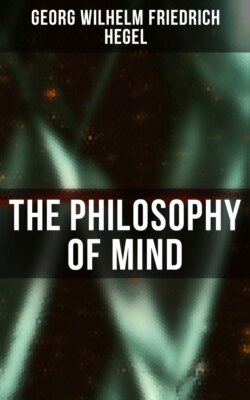Читать книгу The Philosophy of Mind - Georg Wilhelm Friedrich Hegel - Страница 8
На сайте Литреса книга снята с продажи.
(iv.) Mind or Spirit.
ОглавлениеIt may be said, however, that for such a range of subjects the term Mind is wretchedly inadequate and common-place, and that the better rendering of the title would be Philosophy of Spirit. It may be admitted that Mind is not all that could be wished. But neither is Spirit blameless. And, it may be added, Hegel's own term Geist has to be unduly strained to cover so wide a region. It serves—and was no doubt meant to serve—as a sign of the conformity of his system with the religion which sees in God no other-world being, but our very self and mind, and which worships him in spirit and in truth. And if the use of a word like this could allay the “ancient variance” between the religious and the philosophic mood, it would be but churlish perhaps to refuse the sign of compliance and compromise. But whatever may be the case in German,—and even there the new wine was dangerous to the old wine-skin—it is certain that to average English ears the word Spiritual would carry us over the medium line into the proper land of religiosity. And to do that, as we have seen, is to sin against the central idea: the idea that religion is of one blood with the whole mental family, though the most graciously complete of all the sisters. Yet, however the word may be chosen, the philosophy of Hegel, like the august lady who appeared in vision to the emprisoned Boëthius, has on her garment a sign which “signifies the life which is on earth,” as also a sign which signifies the “right law of heaven”; if her right-hand holds the “book of the justice of the King omnipotent,” the sceptre in her left is “corporal judgment against sin20.”
There is indeed no sufficient reason for contemning the term Mind. If Inductive Philosophy of the Human Mind has—perhaps to a dainty taste—made the word unsavoury, that is no reason for refusing to give it all the wealth of soul and heart, of intellect and will. The mens aeterna which, if we hear Tacitus, expressed the Hebrew conception of the spirituality of God, and the Νοῦς which Aristotelianism set supreme in the Soul, are not the mere or abstract intelligence, which late-acquired habits of abstraction have made out of them. If the reader will adopt the term (in want of a better) in its widest scope, we may shelter ourselves under the example of Wordsworth. His theme is—as he describes it in the Recluse—“the Mind and Man”: his
“voice proclaims
How exquisitely the individual Mind
(And the progressive powers perhaps no less
Of the whole species) to the external World
Is fitted;—and how exquisitely too
The external World is fitted to the Mind;
And the creation (by no lower name
Can it be called) which they with blended might
Accomplish.”
The verse which expounds that “high argument” speaks
“Of Truth, of Grandeur, Beauty, Love and Hope
And melancholy Fear subdued by Faith.”
And the poet adds:
“As we look
Into our Minds, into the Mind of Man—
My haunt, and the main region of my song;
Beauty—a living Presence of the earth
Surpassing the most fair ideal forms
... waits upon my steps.”
The reality duly seen in the spiritual vision
“That inspires
The human Soul of universal earth
Dreaming of things to come”
will be a greater glory than the ideals of imaginative fiction ever fancied:
“For the discerning intellect of Man,
When wedded to this goodly universe
In love and holy passion, shall find these
A simple produce of the common day.”
If Wordsworth, thus, as it were, echoing the great conception of Francis Bacon,
“Would chant, in lonely peace, the spousal verse
Of this great consummation,”
perhaps the poet and the essayist may help us with Hegel to rate the Mind—the Mind of Man—at its highest value.
